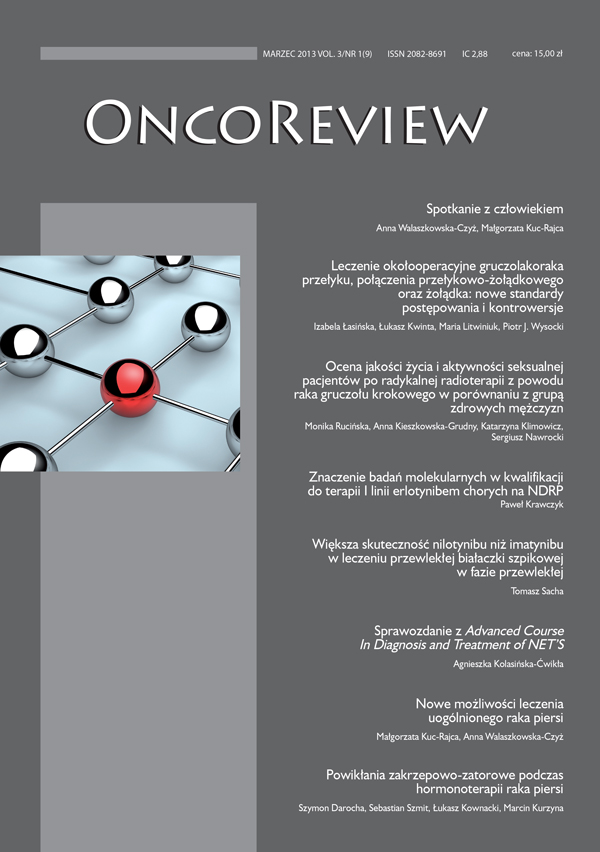New possibilities of therapy for advanced, metastatic breast cancer Review article
Main Article Content
Abstract
Despite improving screening methods, diagnosis of early breast cancers, new therapies the prognosis in breast cancer remains poor. Advanced, metastatic breast cancer is an incurable, persistent disease. Hormonotherapy is the main treatment of receptor positive breast cancer patients. Till now in case of hormone resistant disease chemotherapy was the only choice nowadays there is possibility to use combination of endocrine and targeted therapy, the mTOR inhibitor everolimus. In HER2 receptor positive breast cancer therapy with trasuzumab improved treatment results. Despite many new treatment methods there is still need for new therapies which could improve the patients outcome.
Downloads
Article Details

This work is licensed under a Creative Commons Attribution-NonCommercial 4.0 International License.
Copyright: © Medical Education sp. z o.o. This is an Open Access article distributed under the terms of the Attribution-NonCommercial 4.0 International (CC BY-NC 4.0). License (https://creativecommons.org/licenses/by-nc/4.0/), allowing third parties to copy and redistribute the material in any medium or format and to remix, transform, and build upon the material, provided the original work is properly cited and states its license.
Address reprint requests to: Medical Education, Marcin Kuźma (marcin.kuzma@mededu.pl)
References
2. Andre F., Slimane K., Bachelot T. et al.: Breast cancer with Synchronous metastases: trends in survival during a 14-Year Period. J. Clin. Oncol. 2004; 22: 3302-8.
3. Sundquist M., Eriksson Z., Tejler G. et al.: Trends in survival in metastatic breast cancer. Eur. J. Cancer 2010; 8(3): 191 (abstract 453).
4. Goldhirsch A., Wood W.C., Coates A.S. et al.: Strategies for subtypes-dealing with the diversity of breast cancer: highlights of the St Gallen International Expert Consensus on the Primary Therapy of Early Breast Cancer 2011. Ann. Oncol. 2011; 22 (8): 1736-47.
5. Harris L., Fritsche H., Mennel R. et al.: American Society of clinical oncology 2007 update of recommendations for the use the tumor markers in breast cancer. J. Clin. Oncol. 2007; 25(33): 5287-312.
6. Slamon D.J., Clark G.M., Wong S.G.: Human breast cancer: correlation of relapse and survival with amplification of the HER-2/neu oncogene. Science 1987; 235: 177-82.
7. Dawood S., Broglio K., Buzdar A.U.: Prognosis of women with metastatic breast cancer by HER2 status and trastuzumab treatment: an institutionalbased review. J. Clin. Oncol. 2010; 28: 92-8.
8. Verma S., Miles D., Gianni L. et al.: Trastuzumab Emtansine for HER2-Positive Advanced Breast Cancer. N. Engl. J. Med. 2012; 5: 1-9.
9. Baselga J., Gelman K.A., Verma S. et al.: Phase II of pertuzumab and trastuzumab in patients with human epidermal growth factor receptor 2-positive metastatic breast cancer that progressed during prior trastuzumab therapy. J. Clin. Oncol. 2012; 28(7): 1138-44.
10. Baselga J., Cortés J., Kim S. et al.: Pertuzumab plus Trastuzumab plus Docetaxel for Metastatic Breast Cancer. N. Engl. J. Med. 2011; 8: 1-11.
11. Verma S., Miles D., Gianni L. et al.: Trastuzumab Emtasine for HER2-Positive Advanced Breast Cancer. N. Engl. J. Med. 2012; 367: 1783-91.

